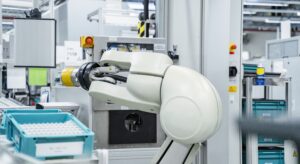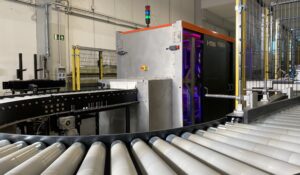The plastics injection molding industry has evolved rapidly thanks to the integration of robotic technologies. This transformation has made it possible to perfect manufacturing processes, improve production accuracy and significantly increase the performance of industrial plants.
Automation not only reduces human error, but also optimizes cycle time, increases product quality and improves safety in the work environment.
Automation of critical processes
Robots have become essential players in the injection molding cycle. Their main functions include loading and unloading parts, removing hot components directly from the mold, automatically trimming burrs, and stacking or final packaging of products. These tasks, which previously relied on human operators, are now executed with pinpoint accuracy and constant speed.
Cartesian robots (X-Y-Z), for example, are widely used for linear pick-and-place tasks, while 6-axis robots enable complex movements in production cells with more flexible requirements. In addition, the emergence of collaborative robots (cobots) is opening up new opportunities in environments where safe human-machine interaction is required.
Quality improvement and waste reduction
One of the most outstanding benefits of robotics in this sector is the improvement in the quality of the final product. Thanks to the exact repeatability of robotic movements, dimensional errors are reduced and variations caused by human fatigue are eliminated. In addition, by handling hot parts just out of the mold, deformation is avoided and the cooling process is accelerated.
Machine vision systems, integrated with robots, allow automatic in-line inspections. This facilitates the detection of defects such as cracks, badly cut burrs or color errors, improving quality control without the need to stop production.
Robotics as a pillar of Industry 4.0
Robotics in plastic injection molding is a key part of the Industry 4.0 ecosystem. The integration of robots with MES (Manufacturing Execution Systems) and industrial IoT platforms allows real-time data collection, performance analysis and on-the-fly adjustment of production parameters.
In addition, with the support of artificial intelligence, robots can learn from previous patterns, optimize motion paths and predict failures, further raising operational efficiency.
In short, we can say that the incorporation of robotics in plastic injection molding is not an option, but a necessity for companies seeking to remain competitive in a globalized environment. This technology makes it possible to achieve faster, more precise and safer production, while improving traceability and the ability to adapt to new manufacturing challenges. The future of plastics manufacturing will undoubtedly involve ever-closer collaboration between intelligent machines and skilled operators.
En el departamento de ingeniería de i-mas estamos especializados en la combinación de tecnologías de visión artificial, deep learning y automatización industrial en procesos productivos, lo que nos permite ofrecer soluciones integrales adaptadas a las necesidades específicas de cada cliente.
Want to learn more about our services? Contact us or visit our projects section!



